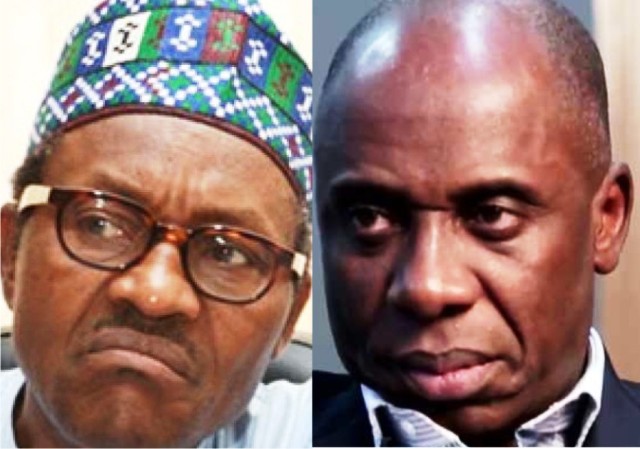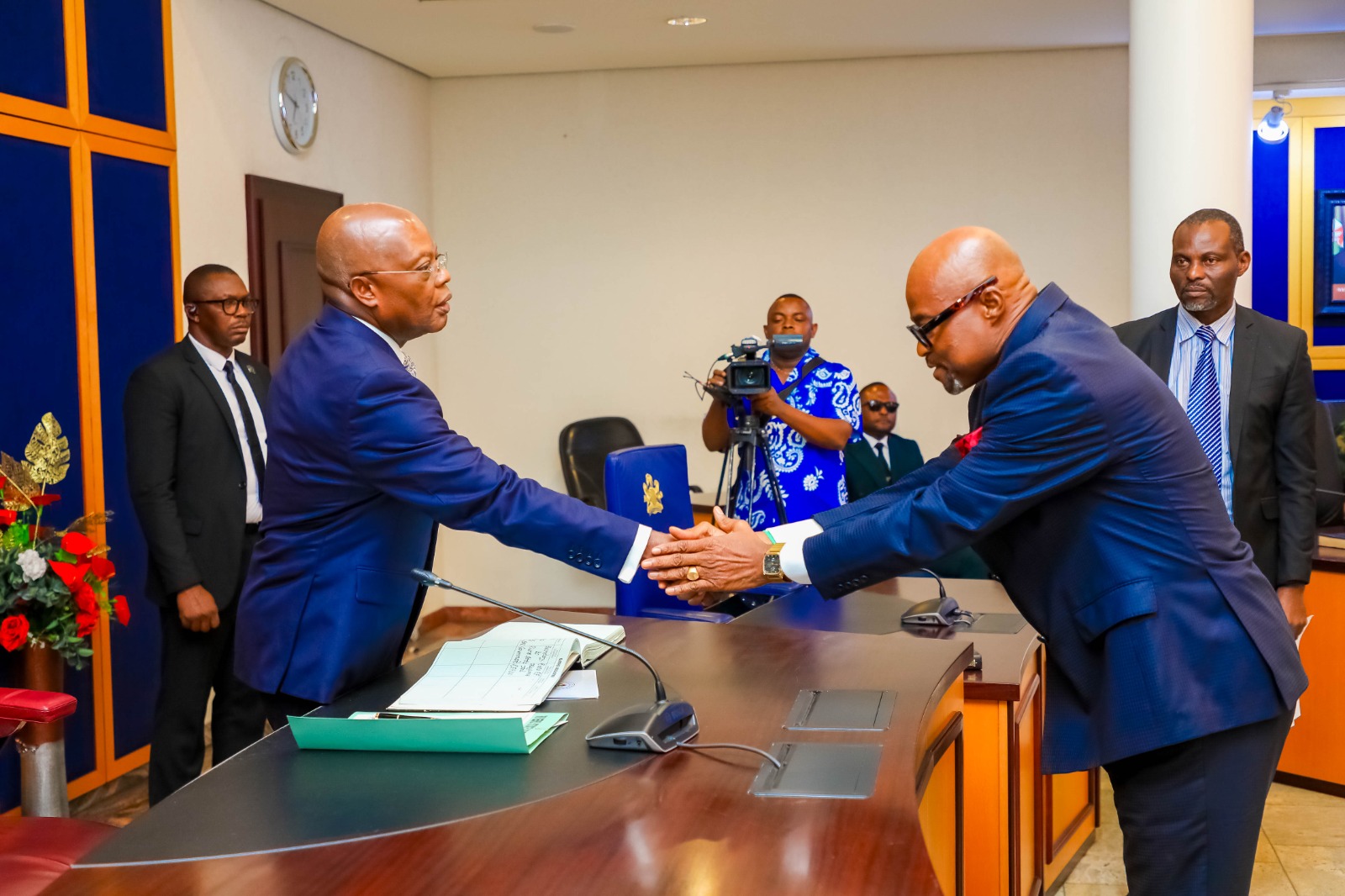Featured
Judges’ Raid, DSS, Amaechi …What To Do, If I Were Buhari

One of the pillars on which the Buhari Presidency rests is the War Against Corruption, a subject which many Nigerians believe was well-thought out. Their position is strengthened by the high credentials and pedigree of the driver of the crusade.
President Muhammadu Buhari, before the 2015 general elections, was acclaimed as a simple, modest and disciplined leader, not given to the known habits of ostentatious living, corruption and abuse of office. It was indeed these qualities that made his averment to fight corruption believable.
It was also on the crest of those values that Muhammadu Buhari became President. He matched public expectations with his public declaration of assets with as little as N3 million cash in earnings, a few cows and a plot of land in Port Harcourt, which location he was yet to be told.
That meant one of few things. That it was a mere promise by the then Governor of Rivers State, Chibuike Rotimi Amaechi. That Buhari, at the time of declaring his assets, did not have valid documents, including C of O, to lay claim to such asset. Or that it was a post-declaration, pending when he would get such land.
Whatever interpretations Nigerians may draw from that land claim, it showed transparency on the part of the President, even if, were such a gift given to former President Goodluck Jonathan by say, the Kaduna State Government, it would be revoked. That is a talk for another day.
But truth is, Buhari carries with him the reputation of one capable of fighting corruption of any kind to its logical conclusion. A key hindrance, however, might well be the measure of goodwill he enjoyed, by way of campaign and election sponsorship by defecting Peoples Democratic Party (PDP) governors, alleged to have diverted huge funds belonging to their states into his Presidential Project.
How would Buhari fight persons who contributed to his campaign project, since it was clear that he did not have the required resources to finance his presidential project? Or is it that such funds diversion did not rise to the level of corruption since they were channeled to a ‘noble cause’, the cause of helping to elect a pious man?
But by far the major criticism of the war against corruption, even among foreign commentators is that it is selective. That it targets mainly opposition politicians whose actions threatened his electoral fortunes, in the three instances, he took shots at the presidency
This is why many believe that the recent raid and subsequent arrest of judges by men of the Directorate of State Services, DSS, in a Gestapo style sting operation, followed same selective pattern. Most Nigerians agree that there is corruption in the Judiciary but believe that no judge, friendly to the ruling All Progressives Congress (APC- led) Federal Government would have suffered such embarrassment in the hands of the executive arm.
That is why it did not come as a surprise to many when two of the affected judges cried out that they were being hounded for not doing the bidding of agents of the government concerning election cases involving the ruling APC.
Last Friday, many Nigerian national daily newspapers were awash with damning headlines on the cries of one of the judges, a second within days.
The Punch of Friday October 21, 2016 has as its banner lead headline: ‘Another Judge Says Amaechi Asked Him To Influence Judgments’.
The Guardian led with, ‘Another Judge Blames Chibuike For Arrest By DSS’, while, The Sun screamed, ‘Amaechi Offered Me Bribe To Sack Fayose; – Allegation Mere Fiction, Says Transport Minister.
Even the pro – APC Nation Newspaper had the headline, Judge: Amaechi Asked Me to Help Nullify Fayose’s Election; – Justice Ngwuta’s Allegatioin Is Fiction – Minister.
The publications stemmed from a petition by one of the affected judicial officers, a Justice of the Supreme Court, Justice Nwali Sylvester Ngwuta to the Chief Justice of Nigeria (CJN), Justice Mahmud Mohammed, and the National Judicial Council (NJC).
Dated October 18, 2016, the petition chronicled events that led to the raid of his home and eventual arrest. In brief, Justice Ngwuta alleged that he was a victim of executive attack for refusing to compromise his ‘sacred oath’ to uphold truth and justice.
Justice Ngwuta pointedly accused former Rivers State Governor and Transportation Minister, Chibuike Rotimi Amaechi and his Science and Technology counterpart, Dr Ogbonnaya Onu of asking him to help influence the Supreme Court’s decision in some election cases.
According to the Justice, his ordeal was connected to his refusal to accede to the requests made by the minister.
Justice Ngwuta’s letter which came 48 hours after that by Justice John Okoro, who was also arrested by the DSS operatives, had accused Amaechi of asking him (Okoro) to influence the apex court’s decision on poll judgments in Rivers, Akwa Ibom and Abia States.
Following in Justice Okoro’s footsteps, Ngwuta in his petition to the National Judicial Council (NJC), traced his ordeal to between 2013 and 2014, when, he alleged that Amaechi approached him at a function at the International Conference Centre (ICC), Abuja, to help set aside judgment on Ekiti State Governor, Ayo Fayose’s election in order to make way for Fayose’s predecessor, and now Minister of Solid Minerals, Kayode Fayemi.
His words: “My present plight started sometime between 2013 and 2014. I represented the then CJN in an event organised at the International Conference Centre (ICC), Abuja.
‘Honourable Rotimi Amaechi came in late and sat next to me at the high table. He introduced himself to me and we exchanged contacts. A few weeks later, Fayose’s case was determined in the Court of Appeal.
‘Amaechi called me by 6.45 am and said he had come to see me, but was told I had left for the office, when he said he could return in the evening. I demanded to know what he wanted, but he would not tell me.
‘He didn’t come that evening, but came the following morning when I was already prepared to go to work.
‘He begged me to ensure Fayose’s election was set aside and another election ordered for his friend Fayemi, to contest. I told him I would not help him and that even if I was on the panel, I would have only my one vote.
‘After the Rivers Governorship election was determined by the Court of Appeal, he called to tell me his ‘ears were full’ and he would like to tell me what he heard. I told him I was out of Abuja at the time. On my return, he came in the evening and even before he sat down, he barked, ‘you have seen Wike’.
After the Supreme Court affirmed the election of Nyesom Wike, Amaechi also called him on phone and said ‘Oga is not happy’.
Transportation Minister Amaechi denied these allegations, describing them as fiction and part of a larger plan to pull him down at all cost.
Pulling someone innocent down is a grave moral, even criminal offence that should not be swept under the carpet, just as the allegations raised by Justices Okoro and Ngwuta.
To inject the needed credibility into the anti-corruption campaign, if I were Buhari, I would instruct that the claims of the Judges and Amaechi be spot-checked.
For instance, which event did both Amaechi and Ngwuta attend and when? That is very easy to find out. Next, after ascertaining that day, were there telephone calls? Affected communication service providers can easily ascertain and even produce transcripts. Did Amaechi and the Judge meet again in the Judge’s home after decision on the Rivers’ governorship elections? That too can be verified.
If I were Buhari, to prove that I am high above such vendetta as alleged by the Judges, I would institute a probe or a judicial inquest with a view to ascertaining truth of the matter.
My Agony is that there are earlier allegations, even valid judicial reports, yet to be attended to and so there may not be any urgency on the current one. Case closed.
Soye Wilson Jamabo
Featured
Bring Your Wealth Of Experience To Governance, Ibas Tasks New SSG

The Sole Administrator of Rivers State, Vice Admiral Ibok Ete Ekwe Ibas (rtd), has charged the new Secretary to the State Government (SSG), Prof Ibibia Lucky Worika to bring his wealth of experience to bear in governance of the State.
Vice Admiral Ibas (rtd) gave the charge shortly after swearing in the new SSG at the executive chambers of Government House on Wednesday night.
The Administrator who congratulated Prof Worika on his appointment said the choice was not merely an administrative decision but a statement of intent.
Vice Admiral Ibas (rtd) explained that the new SSG has an unparallel expertise in law, policy and international governance, which align perfectly with the mission to restore law, order, integrity and public trust in Rivers State.
He said: “To our new SSG, the task ahead is onerous, but your track record leaves no doubt in our minds that you will prove your mettle. Rivers State needs your intellect, grit and unweaving dedication. Together, we will write a new chapter of progress for this great state.
“Prof Worika’s role will be critical in driving this vision, ensuring that every policy, every decision and every action is in consonance with this administration’s mandate to restore law and order, stabilize the polity and to create the necessary conditions for the restoration of democratic institutions and representations.”
Vice Admiral Ibas (rtd) pointed to his maiden address to Rivers people wherein he emphasised that his administration will be committed to delivering an effective governance that is anchored on transparency, accountability and service.
He therefore, enjoined the new SSG to brace up to the demands of his office, and offer his best service as required while also working cooperatively with civil servants.
Vice Admiral Ibas (rtd) said: “You have no time to settle down. You must roll up your sleeves and get to work with the team.
“Our civil servants with whom we will work closely to run this administration are critical stakeholders and we must work with them to ensure that the state continues to function effectively during this administration.
“To the Permanent Secretaries and civil servants as a whole, once more I will ask your kind cooperation and support as we work to achieve our objectives at this time,” he added.
Featured
I Am One Of You, Sole Administrator Tells Rivers People …Warns Against Violence, Crude Oil Sabotage

The Sole Administrator of Rivers State, Retired Vice Admiral Ibok-Ete Ibas (rtd), has assured residents that he is not in the State as a partisan actor or political competitor but as a stabilising force to restore governance and order.
In a state broadcast yesterday, Ibas, who assumed duty at Government House, Port Harcourt, emphasised his commitment to protecting civil liberties and ensuring the safety of all citizens.
However, he issued a stern warning against crude oil sabotage and violence, urging residents to resist any temptation to return to past hostilities.
“For decades, I have dedicated my life to the service of our great nation—first as the 20th indigenous Chief of Naval Staff and later as Nigeria’s High Commissioner to Ghana. I answered this call out of the need for peace in Nigeria, and most importantly, in Rivers State,” Ibas stated.
Describing the prolonged political impasse as a major setback to governance and democracy, he acknowledged the hardships faced by families and businesses due to the prevailing uncertainty.
“As a son of the Niger Delta, I am one of you. I feel the weight of this crisis on families, businesses, and the future of our people,” he said.
Ibas commended President Bola Tinubu’s decisive action in declaring a state of emergency in Rivers State, stressing that it was a necessary move to restore stability and revive economic activities.
“My mandate is clear: restore law and order, ensure stability, and create an enabling environment for economic growth. But this mission requires collective support from all stakeholders, regardless of political affiliation or ethnicity,” he stated.
He discouraged attacks on oil infrastructure, reminding residents of the devastating environmental and economic consequences of such actions.
“The Niger Delta has moved beyond the destruction of oil facilities. We must resist the temptation to return to those ugly days,” he cautioned.
While pledging to uphold civil liberties and the rule of law, the Sole Administrator warned that lawlessness and violence would not be tolerated.
“We will not act arbitrarily, but we will not hesitate to deal decisively with anyone who threatens the peace and stability of Rivers State,” he declared.
Ibas revealed that he had concluded a State Security Council meeting where strategic measures were outlined to de-escalate tensions and prevent further conflict.
Expressing gratitude to President Tinubu for entrusting him with the responsibility, he also acknowledged the National Assembly for approving the emergency declaration.
“I will work closely with the national leadership under the guidance of the President. I am optimistic that Rivers State will emerge stronger and greater,” he concluded.
Featured
Abuja Truck Explosion Death Toll Rises To 10 …As Another Truck Crashes On Same Spot

The Federal Capital Territory Emergency Management Department has confirmed that 10 persons have died in the truck explosion that occurred near Karu bridge, along the Abuja-Keffi Expressway, on Wednesday.
The FEMD’s Head of Public Affairs, Nkechi Isa, confirmed the numbers in a statement, yesterday.
The Acting Director General of the Emergency Department, Abdulrahman Mohammed, had earlier confirmed that eight persons had died as of yesterday morning, with five confirmed dead on the scene, and four others burnt beyond recognition.
““Five people were taken dead from the scene yesterday (Wednesday). Out of the people that were injured, one died, making six. Then this morning (yesterday), when I asked my people to go round, they discovered that two had already died again, making eight. Four of them from yesterday were burnt beyond recognition.”, he explained.
However, in her statement, Isa said the Head, Forecasting Response and Mitigation of FEMD, Mr Mark Nyam, said eight bodies were deposited at the Karu Hospital Morgue, one body at the Asokoro Distinct Hospital Morgue while another body was deposited at the National Hospital.
He added that some victims had been referred to the Gwagwalada Teaching Hospital, Federal Medical Centre, Keffi, and Cedercrest Hospital Abuja for proper care.
Part of the statement reads, “The FCT Emergency Management Department FEMD can confirm that 10 persons lost their lives to the truck explosion that occurred at Karu bridge along Abuja / Keffi expressway.
“The Head Forecasting Response and Mitigation of FEMD, Mr Mark Nyam said eight bodies were deposited at the Karu Hospital Morgue, one body at the Asokoro Distinct Hospital Morgue while another body was deposited at the National Hospital.”
He informed that over 30 persons suffered various degrees of burns.
“Some of the victims have been referred to Gwagwalada Teaching Hospital, Federal Medical Centre,Keffi and Cedercrest Hospital Abuja for proper care,” he said.
Isa also stated that no fewer than 10 vehicles were burnt during the incident, adding that the FEMD boss after a visit to the incident scene, appealed to motorists to observe traffic rules and regulations.
He also cautioned against reckless driving, dangerous overtaking and poor maintenance of vehicles, while urging FCT residents to always use the 112 emergency toll free number in the event of an emergency.
Meanwhile, barely 24 hours after the incident, another fertiliser-laden truck has collapsed on the same spot.
The Tide learnt that the incidence occurred at about 3:54pm yesterday.
The Head of Public Affairs of the FCT Emergency Management Department, Nkechi Isa, confirmed the accident in a statement, stating that the truck collided with a Hijet and a dump truck, adding that no life was lost.
She cautioned road users to drive with caution as the Federal Road Safety Corps was making efforts to tow away the affected vehicles, to avoid traffic built up.
“Another accident has occurred under Karu bridge along the Abuja-Keffi Expressway. Thankfully, no life was lost to the incident. Our Search and Rescue say the accident occurred when a truck laden with fertilizer ran into a Hijet and a dump truck also known as tipper.
“Motorists are advised to drive with caution as the Federal Road Safety Corps is taking steps to tow away the affected vehicles in order to avoid traffic built up,” the statement read.
Meanwhile, several videos showed some persons trying to clear the fertiliser bags from the fallen truck to ease traffic.

